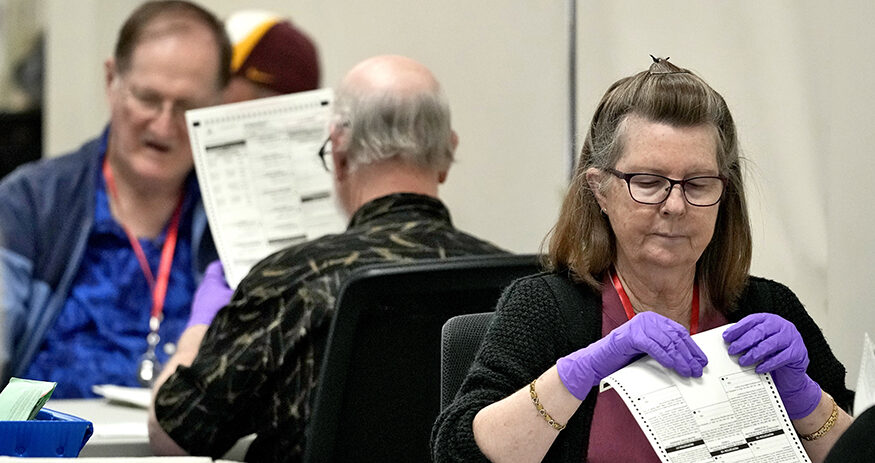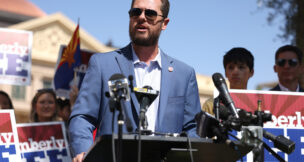State Republicans want party affiliation on ballots for school board candidates
Howard Fischer, Capitol Media Services//March 18, 2025//
State Republicans want party affiliation on ballots for school board candidates
Howard Fischer, Capitol Media Services//March 18, 2025//
Does the political affiliation of a school board candidate matter?
Legislative Republicans think so. And now they want to make sure that voters know which party those candidates are registered with.
A measure awaiting House debate would mandate that, beginning next year, all ballots include each candidate’s partisan designation — defined by how that person was registered 150 days before the election.
The move came over concerns by some foes who said it needlessly injects politics into issues of education.
But Rep. Matt Gress, a Republican who previously served on the board of the Madison Elementary School District in Phoenix, said it’s too late to keep that from happening.
“That bus has left the yard,” he said, pointing out that, at least in the last few elections, both political parties have gotten behind certain school board candidates. All that SB 1441 does, Gress said, is remove the mystery for voters.
And Sen. Mark Finchem questioned whether school board races really are the nonpartisan affairs that they may once have been.
“Sometimes it feels like, to me, that this is just kind of a cover, a fig leaf, that we put on what really is partisan,” said the Prescott Republican.
The vote, however, suggests that Republicans believe that listing candidate affiliation will be more beneficial to their adherents than to Democrats. So far, every vote for the bill was from a Republican, and every vote against it came from a Democrat.
All this comes against a backdrop of an increasing number of issues with a political angle entering into
decisions being made by school boards. That has included not just what courses to offer and clubs to
allow, but what books should be removed from school libraries.
Already approved by the Senate, it now awaits action by the full House.
But its future remains uncertain.
The Republican-controlled Legislature approved a similar measure last year crafted by Justine Wadsack, then a Republican senator from Tucson. But it was vetoed by Democratic Gov. Katie Hobbs.
“This bill will further the politicization and polarization of Arizona’s school district governing boards whose focus should remain on making the best decision for students,” the governor wrote in rejecting the legislation. “Partisan politics do not belong in Arizona’s schools.”
Gubernatorial press aide Christian Slater said SB 1441 is likely to meet the same fate if it reaches the
governor’s desk.
This year’s version is being pushed by Republican Sen. Carine Werner who also is a member of the governing board of the Scottsdale Unified School District. She said her concerns go back to before she was first elected to the board.
“Looking back to when I was voting for school board members prior to getting involved in politics, I never knew who I was voting for in the sense that what party they aligned with, what their values were,” she said.
What convinced her those races already were partisan, Werner said, was that Stand for Children, which advocates for more education spending and has praised Hobbs, spent about $1.4 million supporting not just Democratic legislative candidates, but also contenders for school board races in the 2024 election. And she said the Arizona Education Association paid teachers to knock on doors for Democratic candidates.
But Werner also noted that postcards sent to Republican voters promoting what the party called its “golden ticket” included not just legislative and congressional candidates but also those running for school boards. And the same was true, she said, in mailings to Democrats.
“That is perfectly fine,” Werner said. “But the voters deserve transparency and know which party the candidate aligns with,” something she said should be on the ballot.
Sen. Analise Ortiz did not dispute that school board candidates do get endorsed by various political groups. But the Phoenix Democrat asked why voters can’t do their own research and figure out what is each candidate’s affiliation and positions on issues rather than simply add a partisan label.
“Why is it not enough to trust the voter to do the background research on these candidates?” she asked.
“We have a lot of uneducated voters or people who aren’t involved with the school district that do care about it, but they just don’t have capacity to look into who they’re going to be voting for,” responded Amy Carney, who serves with Werner on the Scottsdale school board. She said that information about party affiliation ensures “every voter has the information they need to make an educated vote.”
And Sen. John Kavanagh said a piece of that is party affiliation, especially when they are not familiar with candidates.
“And what do people use in the place of that?” asked the Fountain Hills Republican.
“They use party affiliation,” he continued. “Because one thing that almost everybody with a pulse knows is that if you’re a Republican, you’re going to tend to be conservative, and, if you’re a Democrat, you’re going to tend to be liberal.”
Kavanagh said that is probably more true now than in the past.
“The parties have purged the moderates,” he said. “So, searching who to vote for, party affiliation is an extremely valuable identifier.”
Less clear is whether there would be any fallout from having school board candidates run with partisan labels.
Ortiz cited a study from the University of Georgia on what happened in North Carolina after school boards were given the option of switching to partisan elections. It said schools located in districts that made the shift experienced an increase in teacher turnover and an increase in less-experienced teachers.
That, said Ortiz, implies “dissatisfaction with policies that were implemented by newly elected, potentially more partisan or more political type of boards.” And she questioned Carney about how such a change would affect Arizona which already has a teacher shortage.
Carney brushed that aside.
“Putting a party affiliation on a ballot shouldn’t mean anything about how you’re going to govern on a school board,” she said. “I don’t think it politicizes the environment any more than it already is.”
That University of Georgia study also said its preliminary results showed that districts that switched to partisan elections “experience reductions in per-pupil spending.” But researchers also found a positive impact on school performance measures at the high school level.














































